Ask anyone what a cow eats, and most people will say grass, since that’s all we see cows consume. While this is true, cows also have a complex diet that includes whole grains, cornmeal, fruits, and vegetables.
As with other livestock, your cows need a balanced diet all year long to be healthy and productive, regardless of whether you’re keeping them for milk or meat.
Can cows eat carrots?
Carrots are safe for cows to eat. They are a tasty and highly nutritious treat for cows when taken in moderation.
Both the root and top of the carrot can be fed to cows as a crunchy treat to supply them with essential nutrients.
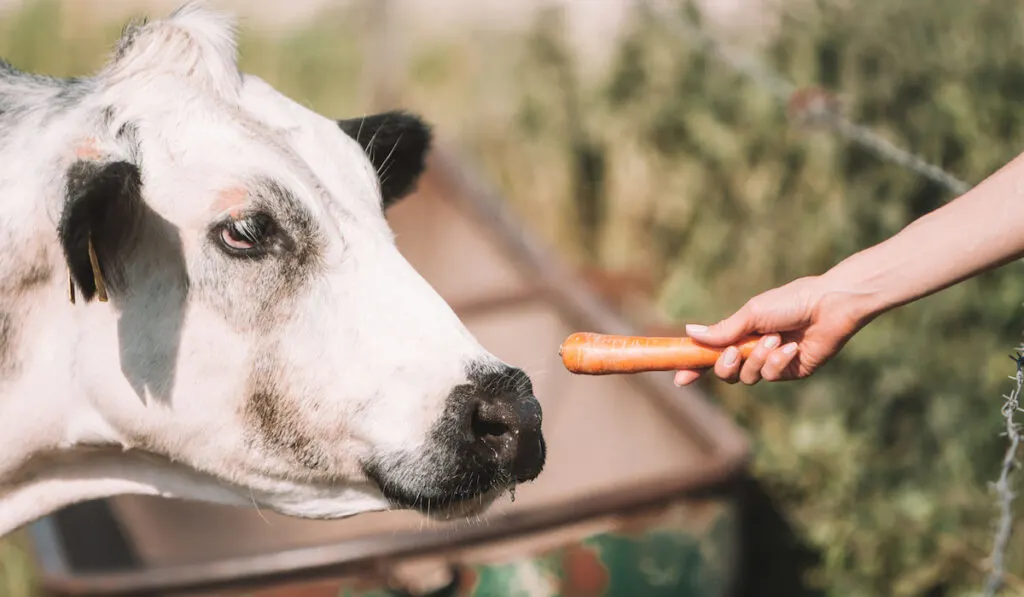
Table of Contents
Are Carrots Good for Cows?
Like most domestic animals, cows are not picky when it comes to their diet. There are, however, a few treats cows enjoy more than others, one of those being carrots. These root vegetables lend energy and nutrition when they are used to supplement a cow’s diet.
Carrots contain 91% of the metabolized energy found in corn, making them a good source of energy for your cows.
Besides increasing energy levels in cows, carrots are also beneficial for milk production. A recent study found that carrots have a positive influence on the quality and nutritional value of cow’s milk (Source).
According to the study, cows that regularly eat carrots produce milk with a higher concentration of Vitamin C, retinol, fatty acids, and other vital nutrients.
Carrots are also safer than other treat options you can consider feeding your cows. This is mainly because they are hardly exposed to harmful pesticides and chemicals on the farm since they grow in the ground.
That said, it’s still recommended to thoroughly wash your carrots before feeding them to your cows to get rid of any dirt on the vegetable.
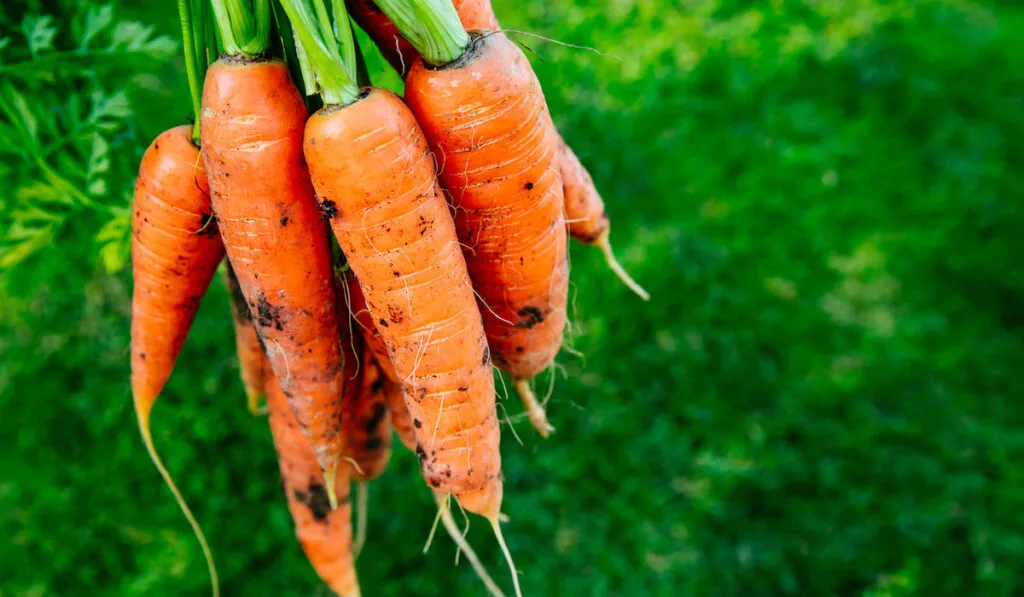
Carrots also have numerous nutrients that are beneficial to cows including:
| Nutrient | Function |
| Vitamin A | Improves cows’ eyesight and helps maintain their respiratory and reproductive health. The vitamins it supplies are also essential to cows that have given birth. |
| Vitamin C | Builds antibodies that strengthen cows’ immune systems. It also helps fight inflammation. |
| Vitamin E | Supplies the cows with vital antioxidants. |
| Vitamin K | Supports blood coagulation. |
| Potassium | Maintains the cow’s blood pressure to prevent heart diseases and kidney stones. |
| Calcium | Helps keep a cow’s bones strong and healthy. It also promotes cardiovascular health by ensuring proper heart and nerve function. |
| Iron | Plays a role in the production of red blood cells to support the transportation of oxygen to all body parts. |
| Magnesium | Supports the reproductive functions of cows and makes the birthing process easier. |
| Fiber | Maintains a cow’s rumen function and supports its energy demands. |
| Protein | Supports the development of body tissues, muscles, and ligaments. |
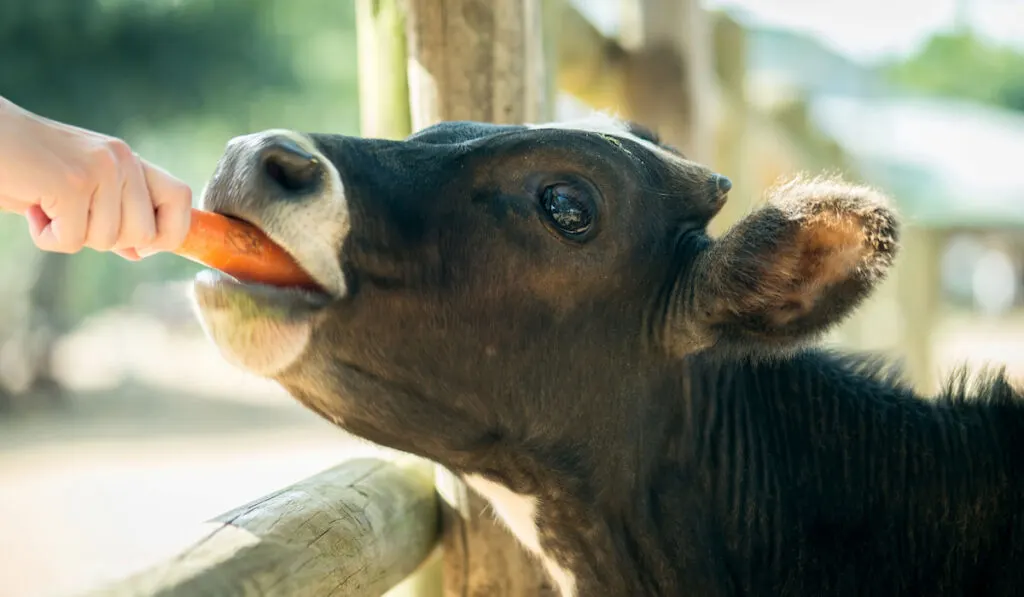
How Many Carrots Can a Cow Eat in a Day?
As enticing as carrots are, it is crucial to practice moderation when feeding them to your cows. That is, you want to keep their carrot intake to less than a quarter of their daily feed.
For instance, a high-producing cow consumes about 120 pounds (54 kilograms) of food in a day and their carrot intake, therefore, should not exceed 30 pounds (13.6 kilograms).
You could be wondering what’s the danger of giving your cows too many carrots.
Firstly, carrots are a treat for cows and should not be used as a replacement for their main food. Feeding cows too many carrots can lead them to forgo their main meal and, therefore, miss out on essential nutrients.
Additionally, cows can face serious health consequences when they consume too many carrots. Carrots contain nitrates that are broken down into nitrites by the body. Too many nitrites can lead to nitrate poisoning, which affects the blood’s ability to transport oxygen to body organs and tissues.
Consequently, this can cause issues such as body weakness, convulsions, accelerated heartbeat, and rapid breathing.
Should Cows Eat Fresh Carrots?
Like humans, animals love fresh fruits and vegetables, but you need to rethink this strategy when it comes to carrots.
Fresh carrots have a high concentration of fermented sugars and consuming too many can cause scours in cows. This is a diarrhea-like disease that inflames a cow’s intestines.
Cows with scours experience a loss of appetite and find it difficult to stand up. They may also have blood in their stool, and their pulse slows down.
That said, store your fresh carrots in a cool dry place for about 2 weeks to reduce the concentration of the fermented sugars. After which, you can feed the carrots to your cows without any complications.
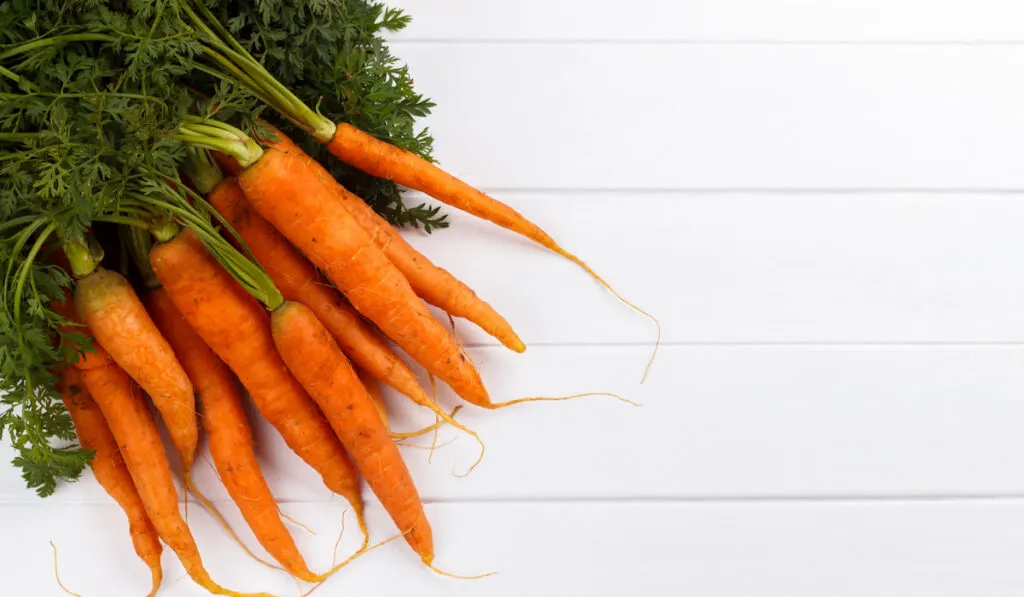
Are Carrot Tops Edible?
Like the carrot root, carrot tops are just as nutritious! The carrot top, which comprises the leaves and stem, is rich in potassium and vitamin K and should be given to cows alongside the carrot root.
And it’s not that the tops are not sweet. The carrot leaves and stems have a sweet, earthy flavor that cows enjoy. So, the next time you serve carrots to your cows, don’t throw away the tops.
Can You Feed Carrots to Calves?
Newborn calves should only take their mother’s milk for the first few months of their life. After that, they can be weaned off the milk and given a diet of hay and silage.
This still isn’t the right time to give them carrots. Give the calves another month for their digestive tract to develop before you can introduce carrots to their diet.
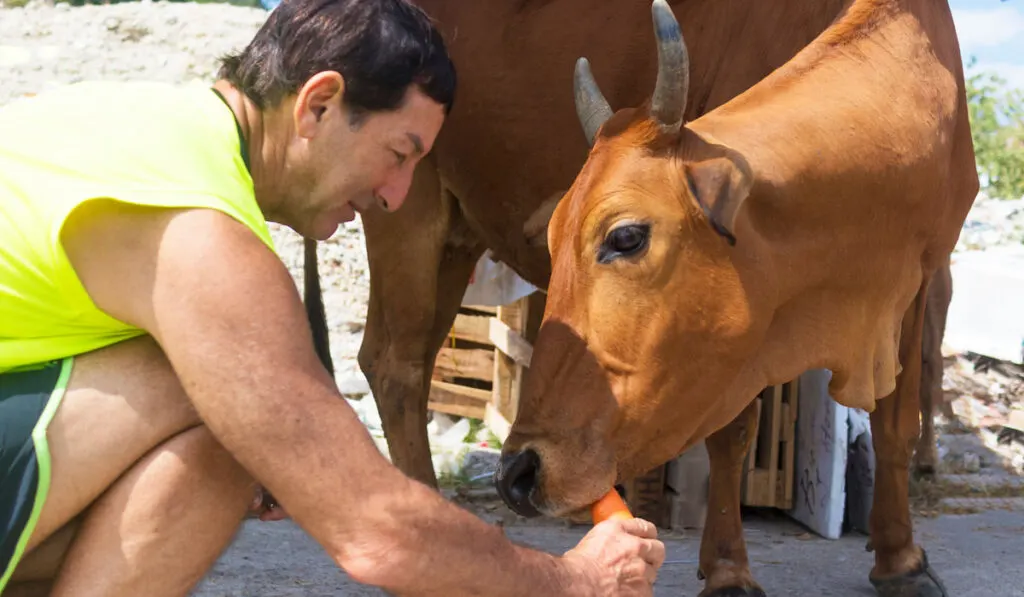
Raw vs. Cooked Carrots
Now that we know carrots are a nutritious treat, how should you serve them to your cows? Should you serve them raw or cooked?
While cooked carrots are healthier because heat breaks down their cell walls to free up more nutrients, cows actually prefer to munch on raw carrots.
Also, one cow can eat as much as 30 pounds (13.6 kilograms) of carrots in a day, and you may not have the capacity to prepare that many carrots for several cows.
How to Prep Carrots for Cows
Now that we’ve established that cows love raw carrots, here’s how best to prepare them for your cows:
Wash Them
Clean your carrots thoroughly to get rid of any dirt and residue on the skin. If you’re not taking the carrots from your garden, you want to go for organically grown carrots to reduce the threat of pesticide contamination.
Peel or No Peel
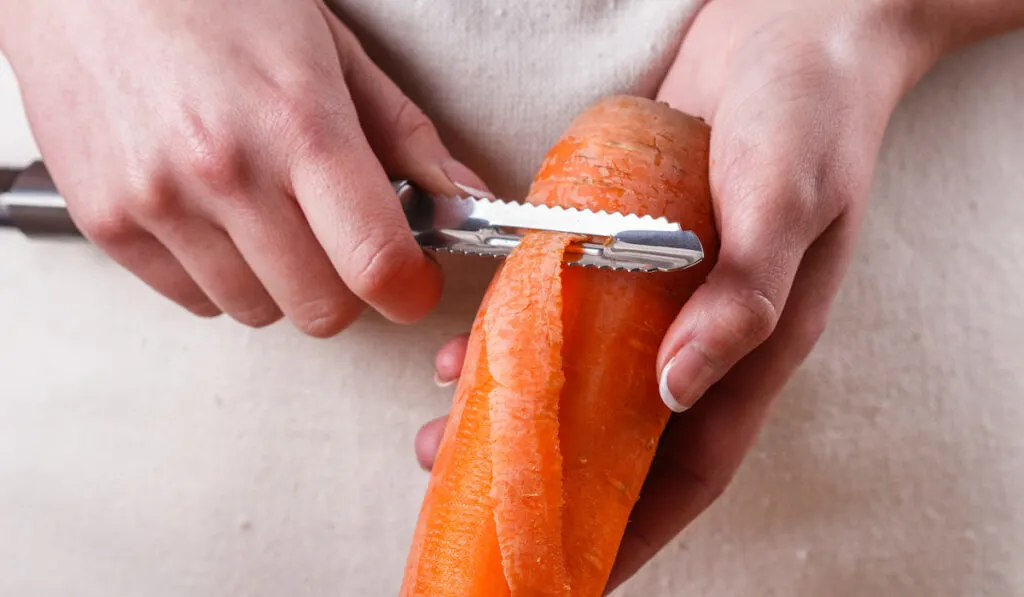
There’s no need to remove the skin before serving carrots to cows. But if the carrots aren’t organically grown, you can remove the skin to ensure your cows don’t consume any toxins.
Mix with Other Foods
Chop the carrots and mix them with other foods your cows love. This way, you encourage your cow to consume their feed while treating them to a crunchy bite.
Start Small
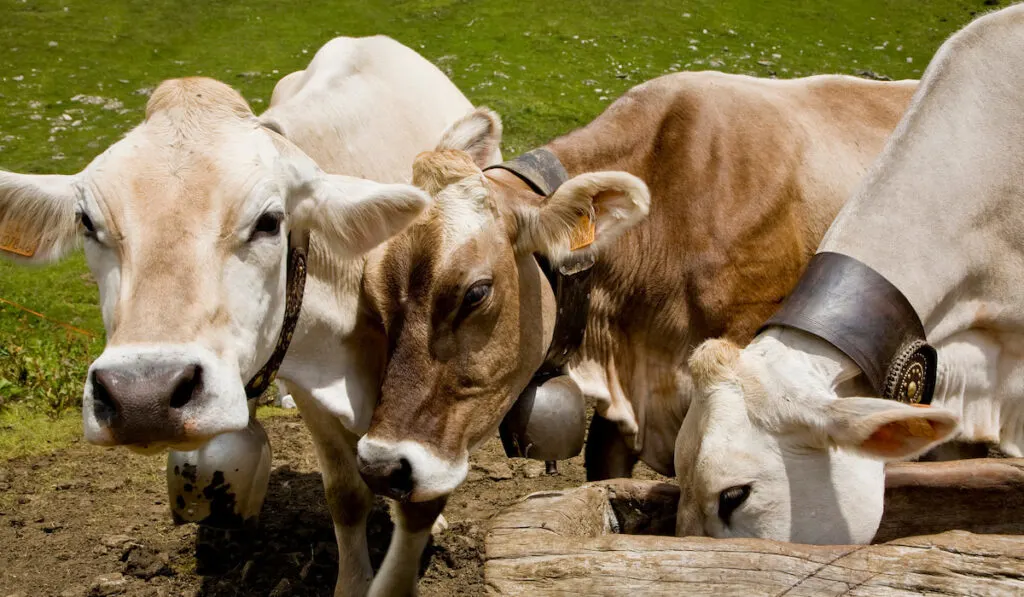
When feeding carrots to your cows for the first time, start with a small portion. Study how they react to the treat, and if there aren’t any negative signs, you can make the snack a key part of their diet.
Pro tip: Feed carrots to your cows at ground level to eliminate the risk of choking. Hold the carrots close to the ground when feeding your cows by hand or place them on a feeding trough to give your cows an easy time when feeding.
Final Thoughts
Carrots are healthy vegetables for cows but only when consumed in moderation. Luckily, they are versatile and easy to incorporate into your cows’ diet without overdoing it. Try them today! You may be surprised at how much your cow loves them.
Resources
- https://petkeen.com/can-cows-eat-carrots/
- https://dairy-cattle.extension.org/how-many-pounds-of-feed-does-a-cow-eat-in-a-day/
- https://farmingbase.com/can-cows-eat-carrots/
- https://animals.mom.com/eating-lot-corn-affect-cows-9538.html
- https://www.canr.msu.edu/beef/uploads/files/FeedingCarrotsorSugarBeets.pdf
- https://animalhype.com/mammals/can-cows-eat-carrots/
